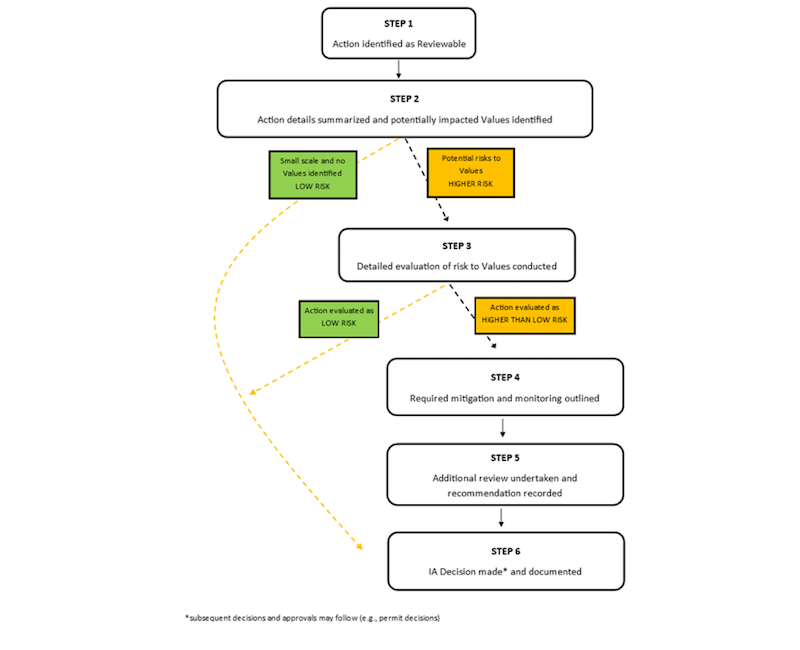BC Parks is responsible for designating, managing and conserving a system of ecological reserves, provincial parks, conservancies, protected areas and recreation areas located throughout the province, that are collectively identified as parks and protected areas (PPA). British Columbia’s PPA are a public trust containing nationally and internationally significant natural and cultural features and outdoor experiences. The provincial system of PPA is dedicated to the protection of natural environments for the inspiration, use, and enjoyment of the public. As such, BC Parks’ mission is to protect representative and special natural places within B.C.’s protected areas system for world-class conservation, outdoor recreation, education, and scientific study.
When an action is proposed to occur within a PPA, BC Parks assesses that action’s potential impacts on the ecological, cultural, and recreational values so that appropriate decisions can be made. Actions can range from minor to major in terms of the potential impact on PPA values. Example actions that occur in PPA include erecting signage, replacing an outhouse, holding a public running race, developing a trail system, installing a structure such as a backcountry hut, or developing new campsites or a new campground. Proposed actions must be assessed regardless of whether the proponent is external or internal to a provincial government agency, including BC Parks itself. BC Parks staff conduct an assessment by following the BC Parks impact assessment (IA) process. This process allows BC Parks staff to identify impacts on PPA values that may be associated with an action, evaluate the significance of those impacts, determine mitigation measures, and assist with making decisions on whether or not the action should proceed.
BC Parks IA policy and procedures were updated in 2018 to improve the consistency and efficiency of the process and the quality of the process outcomes.
Purpose
All actions within PPA, including conservation management and scientific activities, are subject to an assessment of their potential impacts by BC Parks staff. The IA policy and process are intended to:
- Provide a thorough assessment of all potential environmental, social, and economic impacts of proposed actions in PPA
- Ensure provincially consistent standards are followed for impact assessment
- Provide an open and accountable process for standardized, documented decision-making
- Provide for participation in the IA review by the proponent, other agencies, the public, and First Nations, where required
Principles
The following principles provide the foundation for BC Parks’ IA policy and its application:
- Any level of disturbance in a PPA creates a certain level of risk of negative impacts
- Impact assessment is a tool to assist decision makers in making the best possible decisions
- Predicting impacts and determining the significance of impacts should be as objective and quantifiable as possible
- Actions are evaluated for the benefits they provide versus the risks inherent in the actions
- Legislation, park management plans, BC Parks policies, and other relevant provincial government policy provide the primary direction for staff completing impact assessments
- BC Parks’ risk tolerance in the size, scale, and duration of actions and the values placed at risk is low compared with other land management agencies
Application
Proponent
For purposes of this IA policy, the proponent is any individual, company, permittee, or BC Parks staff responsible for proposing an action.
Action
Actions are any proposed project, activity, or management decision that has the potential to cause an impact on the natural, cultural heritage, or recreational environment or conflict with management direction or policy. This includes recreational development projects and proposed new opportunities (facilities, services, activities). An action does not include policy or strategic planning. Actions include, but are not limited to the following:
- New activities, including projects entirely or partly funded, assisted, conducted, regulated, or approved by BC Parks (for example, approval of a new recreational activity or research project, issuance of a commercial guide permit)
- Substantial changes to continuing actions, such as considerable changes in operations, areas of use, methodology, or equipment (for example, use of new equipment for routine maintenance)
- Specific projects such as construction or management activities located in a park (for example, public or private venture projects, expansion or development of facilities, conservation management projects, special projects, or locally funded projects)
Management plan development or major amendments to management plans do not require an IA, as the process includes steps to ensure that values and potential impacts have been appropriately considered in the development of the management plan. The former 1999 BC Parks management planning screens have been incorporated into this current management planning process.
Reviewable vs. non-reviewable actions
Actions proposed to occur within PPA are initially categorized as reviewable or non-reviewable. Non-reviewable actions do not need to be reviewed using the BC Parks IA process. However, if BC Parks determines that there is potential for impacts or risk from any proposed action, BC Parks may conduct an IA. Any action not on this list is considered for approval through the IA process.
Over time and with changing conditions, an approved action in a PPA may result in new potential risks to environmental, cultural heritage, or recreational values (for example, decline in status of a species). In this circumstance, BC Parks may initiate the IA process to review the current impacts of the action, as appropriate.
Supporting policies
The following provincial policies may be applied to assess impacts of an action and are deemed consistent with the BC Parks IA process:
First Nations consultation
The Province has a duty to consult with, and where required accommodate, First Nations whenever it proposes a decision or activity that could impact Indigenous interests. The duty stems from court decisions and is consistent with the Province’s commitment to building a new relationship with First Nations.
The depth of consultation required is dependent on the specific strength of claim to Aboriginal rights, including title and rights of the First Nation, and the level of potential impact of the proposed activity on those rights. Consultation should be undertaken with the intention of reasonably addressing those impacts, and when required, accommodation measures should be implemented.
BC Parks’ consultation procedures are currently being reviewed by the BC Parks Indigenous Relations section to ensure consistency with the provincial natural resource sector policy direction. For more information on proposed updates to consultation procedures, contact BC Parks Indigenous Relations section staff.
Public participation
Impact assessments may be informed by public input and public participation, and proposed actions may receive public input and review through management planning or other processes at the discretion of BC Parks. Formal public input processes specific to a proposed action most often occur for large-scale projects with higher risk potential for impacts and may be implemented by a project proponent, another regulatory agency or BC Parks. BC Parks may also undertake informal discussions with specific interest groups or individuals if there is a reasonable likelihood for public concern.
Costs
The proponent bears all costs incurred by the IA process, with the exception of BC Parks staff time and expenses incurred through review and administration of the IA process. The proponent’s costs include preparation of project description, collection of additional information if required, preparation and revision of reports, and ongoing monitoring of the action.
Information for external proponents
An external proponent looking to complete a reviewable action within a park or protected area will need to complete the IA process. The IA information requirements will be determined and led by BC Parks staff. An IA may be a necessary step for adjudication of a new park-use permit or an existing park-use permit amendment application.
The proponent’s responsibilities are to:
- Provide accurate information on proposed action and their understanding of the potential impacts
- Where necessary, hire and be responsible for paying the fees of a qualified professional (QP)1 or subject matter expert (SME)2 to collect further information about the proposed action and its potential impacts
The need to hire a QP or SME is at the discretion of BC Parks staff. Please see our guidelines for external proponents.
- Identify appropriate mitigation measures and confirm that the measures will be implemented if the action is approved
- Notify BC Parks of any changes to proposed actions at any time during the IA process
If the proponent receives approval to conduct the proposed action, the proponent’s responsibilities are then to:
- Notify BC Parks when the action begins and ends
- Notify BC Parks of any proposed changes to the action prior to implementing any changes
- Implement the mitigation measures identified during the IA process
- Provide monitoring and reporting during or following implementation of the action
The type of monitoring and reporting required is determined in the IA process at the discretion of BC Parks staff.
If you are considering an action in a PPA, contact the local BC Parks area supervisor to discuss your proposed project.
If your proposed action requires a park use permit, please go to natural resources online services to initiate the application process.
1. Qualified professional (QP): An applied scientist or technologist who is registered and in good standing with an appropriate BC professional organization constituted under an Act. The QP must be acting under that association’s code of ethics and be subject to the organization’s disciplinary action. A QP could be a professional biologist, agrologist, forester, geoscientist, engineer or technologist.
2. Subject matter expert (SME): A person with demonstrated skills, abilities and expertise in a desired topic area. This person is equivalent to a qualified professional (QP) but may not have the professional designation.
Overview of process

